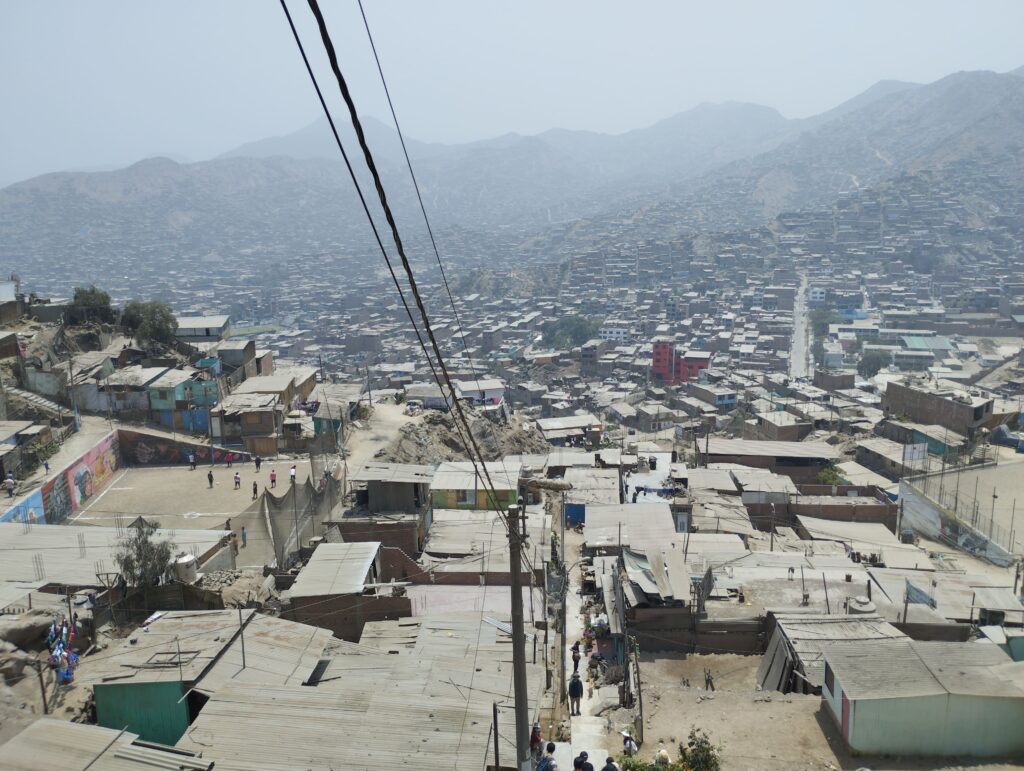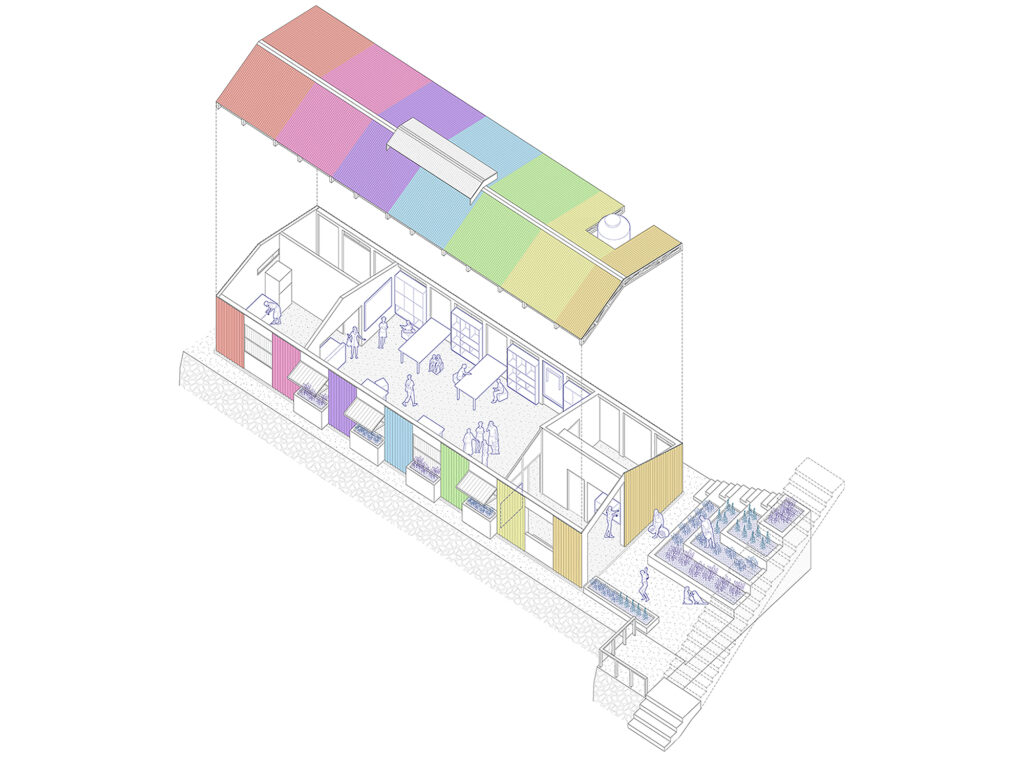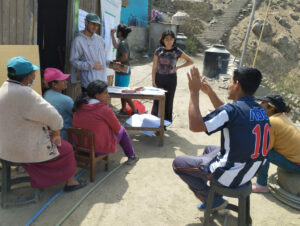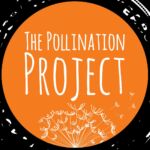1 out of every 4 people lived in poverty in Peru in 2022, according to the National Institute of Statistics and Information Technologies of Peru.
“I am very moved by the idea of shared dreams. In the beginning someone else’s dream may not come across as yours but, once they have shared it with you, it ends up becoming yours as well.”
Andre Velasquez, co-founder of Habitable.
Many different realities comprise every city or town. When we take a closer look, we see how poverty and wealth are closely tied together and yet these concepts separate humans in many ways. While some have everything, others are in desperate need of the most basic things. While some plead for help, many become indifferent to others suffering. This is something that didn’t go unnoticed by Andre Velasquez and motivated him to design a more equitable horizon in his country, Peru.
Building Socially Aware Spaces
Andre Velasquez is a Peruvian architect with postgraduate studies on Participatory and Sustainable Design Methodologies for the Social Production of Habitat. He is committed to working for local communities living under vulnerable conditions and believes in participatory and horizontal design processes as tools for social transformation. But making the decision to shape more than buildings and transform the reality around him was something that came along after immersing himself in a polarized reality.
“I had always been very critical about the education I was receiving at my university,” recalls Andre. “In college, as students, we were encouraged to make multimillion housing projects or luxury hotels and it felt as if we were being guided towards that path. Although in my country, Peru, you can take a 10 minute drive away from Lima and face a reality of human settlements living in poverty which is completely different from what we were being taught in college. So I asked myself, ‘Why are we not looking at this other reality?’”
When Andre finished college, he came across a contest to design social housing, which meant creating 5 houses for 5 families who lived in a human settlement. He participated in the contest along with two other friends which allowed them to meet and connect with neighbors from the area.
“This was a very meaningful moment for me because I could empathize with a family who had been living there for a long time. I felt their frustration and helplessness. They had been living there for 20 years with no water, or electricity,” remembers Andre. “I just felt committed to this reality, I could no longer be indifferent.”
A Cycle of Poverty in Peru

In the last poverty report made by the government of Peru, the National Institute of Statistics and Information Technologies (Instituto Nacional de Estadísticas e Informática de Perú) stated that 27.5% of the country’s population was affected by poverty; with an incidence of 41.1% in rural areas and 24.1% in urban areas.
The University of Lima noted that by 2016 around 3,520 informal human settlements had been formalized in Peru through state policies and that they comprised 7.8 million people. The institution acknowledged the vulnerability of the population living in these settlements and attributed the causes to the lack of employment sources, disconnection from transportation networks and inadequate housing. Each of these elements work against the possibility of thriving for the community inhabitants and entraps them in a cycle of poverty.
Reshaping Horizons Through Habitable
In 2020, Andre and a group of professionals decided to fund Habitable, a transdisciplinary non-profit association meant to accompany processes of social production of habitat through the use of participatory methodologies and popular education techniques. These methodologies and techniques enhance the self-management capacity and the organizational level of the communities through the integral improvement of the habitat and the quality of life of its members.
Nowadays, the team is made up of 6 members which include: architects, sociologists, anthropologists and psychologists. They meet with members from vulnerable communities who have a social project and work together to make it happen. From the viability, organization, design, fund gathering and actual construction of diverse infrastructure spaces that may become anything from parks to actual buildings, the team makes it happen.
The latest Habitable project is in the José Carlos Mariátegui Human Settlement, founded in 2011 where over 60 families are under poverty conditions and without public services like water, drainage or electricity as well as no consolidated access roads, so mobility implies a high risk. Working along the community organization 10 de Julio, Habitable will build a collective space where they will install a common kitchen and they will be able to hold meetings, receive training workshops, art and reinforcement classes for children, store tools and materials and even use it for personal hygiene.

The Biggest Challenge
For Andre’s organization, the biggest challenge is gathering the funds for their project. They have the skills, the will and the people to help uplift underprivileged communities, but not the funds.
“We heard about The Pollination Project from a friend in Colombia who applied for the funds in an organization called CLAP which aims to develop education. They told us we should apply,” remembers Andre. “When we knew we were receiving the grant we felt great joy because it is the first fund we have won. And this particular project was in danger of not happening because we didn’t have any money to do it.”
 The funds from The Pollination Project will allow Habitable to buy some of the materials needed for the construction of the community hub which will also be built with recycled materials and natural resources from the local landscape.
The funds from The Pollination Project will allow Habitable to buy some of the materials needed for the construction of the community hub which will also be built with recycled materials and natural resources from the local landscape.
“Thanks to everyone at TPP from our organizations and from the community who are really excited because without you this project couldn’t be a reality. You will always have a place in our heart and in the community’s heart because you are a part of this dream,” says Andre with a wide smile, eager to continue shaping a more equitable world for everyone.
Join Us
If you are inspired by this work and have an idea for a project that addresses an issue that you are passionate about, we’d like to invite you to submit an application and together we will build a better, more compassionate future!
If you would like to support the work of more changemakers like this around the world, please visit our donation page and make a gift today!


